Related Research Articles

The Matchmaker is a 1954 Broadway play by Thornton Wilder, a rewritten version of his 1938 play The Merchant of Yonkers.

José Vicente Ferrer de Otero y Cintrón was a Puerto Rican actor and director of stage, film and television. He was one of the most celebrated and esteemed Hispanic American actors—or, indeed, actors of any ethnicity—during his lifetime and after, with a career spanning nearly 60 years between 1935 and 1992. He achieved prominence for his portrayal of Cyrano de Bergerac in the play of the same name, which earned him the inaugural Tony Award for Best Actor in a Play in 1947. He reprised the role in a 1950 film version and won an Academy Award for Best Actor, making him the first Hispanic actor and the first Puerto Rican-born to win an Academy Award.
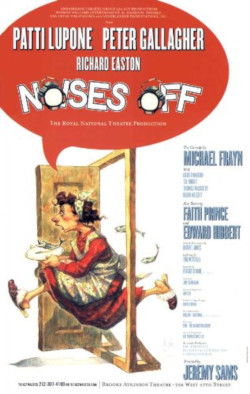
Noises Off is a 1982 farce by the English playwright Michael Frayn.

Fred Ebb was an American musical theatre lyricist who had many successful collaborations with composer John Kander. The Kander and Ebb team frequently wrote for such performers as Liza Minnelli and Chita Rivera.
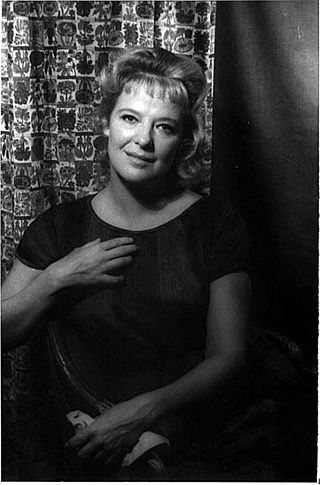
Kim Stanley was an American actress, primarily in television and theatre, but with occasional film performances.

Debra Monk is an American actress, singer, and writer, best known for her performances on the Broadway stage. She is the recipient of a Tony Award (1993), 2 Drama Desk Awards, the Helen Hayes Award (1994), the Obie Award (2000) and an Emmy Award (1999) for her work.
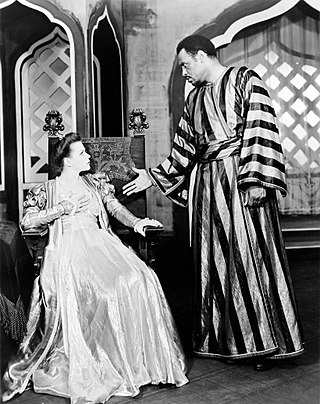
Uta Thyra Hagen was a German-American actress and theatre practitioner. She originated the role of Martha in the 1962 Broadway premiere of Who's Afraid of Virginia Woolf? by Edward Albee, who called her "a profoundly truthful actress." Because Hagen was on the Hollywood blacklist, in part because of her association with Paul Robeson, her film opportunities dwindled and she focused her career on New York theatre.
Golden Boy is a drama by Clifford Odets. The play was initially produced on Broadway by The Group Theatre in 1937. Odets' biggest hit was made into a 1939 film of the same name, starring William Holden in his breakthrough role, and also served as the basis for a 1964 musical with Sammy Davis Jr.

David Patrick Kelly is an American actor, musician and lyricist who has appeared in numerous films and television series. He is best known for his role as the main antagonist Luther in the cult film The Warriors (1979). Kelly is also known for his collaborations with Spike Lee, in the films Malcolm X (1992), Crooklyn (1994), and Chi-Raq (2015), and with David Lynch, appearing in Wild at Heart (1990) as well as Twin Peaks (1990–91) and its 2017 revival.
Richard Eldridge Maltby Jr. is an American theatre director and producer, lyricist, and screenwriter. He conceived and directed the only two musical revues to win the Tony Award for Best Musical: Ain't Misbehavin' and Fosse.

Bartlett B. Sher is an American theatre director. The New York Times has described him as "one of the most original and exciting directors, not only in the American theater but also in the international world of opera". Sher has been nominated for nine Tony Awards, winning a Tony Award for Best Direction of a Musical for the 2008 Broadway revival of South Pacific.

Marcia Rodd is an American actress, singer, and director. After studying theatre at Northwestern University, she moved to New York City and began a successful career as a stage actress.

Twentieth Century is a 1932 play by Ben Hecht and Charles MacArthur based on the unproduced play Napoleon of Broadway by Charles B. Millholland, inspired by his experience working for the eccentric Broadway impresario David Belasco.
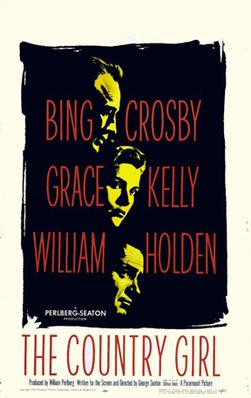
The Country Girl is a 1954 American film drama written and directed by George Seaton and starring Bing Crosby, Grace Kelly, and William Holden. Adapted by Seaton from Clifford Odets's 1950 play of the same name, the film is about an alcoholic has-been actor who has been given one last chance he to resurrect his career. Seaton won the Academy Award for Best Adapted Screenplay. The film was entered in the 1955 Cannes Film Festival.
The Internet Off-Broadway Database (IOBDB), also formerly known as the Lortel Archives, is an online database that catalogues theatre productions shown off-Broadway.
Christopher Akerlind is an American lighting designer for theatre, opera, and dance. He won the Tony Award for Best Lighting Design for Indecent. He also won the Tony Award for Best Lighting Design and the Drama Desk Award for Outstanding Lighting Design for Light in the Piazza and an Obie Award for sustained excellence for his work Off-Broadway.

Trazana Beverley is an American stage and film actress as well as a lecturer in acting. She received a BFA in Acting from New York University's Tisch School of the Arts.
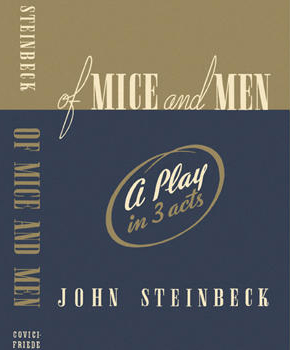
Of Mice and Men is a play adapted from John Steinbeck's 1937 novel of the same name. The play, which predates the Tony Awards and the Drama Desk Awards, earned the 1938 New York Drama Critics' Circle Best Play.
The Philanthropist is a play by Christopher Hampton, written as a response to Molière's The Misanthrope. After opening at the Royal Court Theatre, London in August 1970, the piece, directed by Robert Kidd, transferred to the May Fair Theatre in the West End and ran there for over three years, subsequently going on a regional tour in 1974. In the meantime, the play, directed once again by Kidd, premiered on Broadway in March 1971, running till May of the same year. Kidd had previously collaborated with Hampton on When Did You Last See Your Mother? (1964), which had also been staged at the Royal Court Theatre.
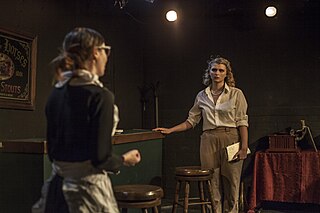
The Big Knife is an American play by Clifford Odets. The original production was directed by Lee Strasberg, who had worked with Odets at the Group Theatre, and starring fellow Group Theatre alumnus John Garfield. The play debuted at Broadway's National Theatre on 24 February 1949 before closing on May 28 after 109 performances. The Big Knife marked the return of Odets to Broadway after a six-year hiatus in which he toiled in Hollywood as a screenwriter and motion picture director. The play concerns the disillusionment of a movie star with the Hollywood's studio system and disgust with himself, as he has lost his idealism in the pursuit of success.
References
Notes
- ↑ Gussow, Mel (January 15, 2004). "Uta Hagen, Tony-Winning Broadway Star and Teacher of Actors, Dies at 84". The New York Times . Retrieved August 30, 2013.
- 1 2 "The Country Girl" (production) on IBDB.com
- ↑ "Awards" on IBDB.com
- ↑ "The Country Girl" (play) on IBDB.com
- ↑ "The Country Girl" (production) on IBDB.com
- ↑ "The Country Girl" (production) on IBDB.com
- ↑ "The Country Girl" (play) on IOBDB
- ↑ "The Country Girl" (production) on IOBDB
- ↑ "The Country Girl" (production) on IOBDB